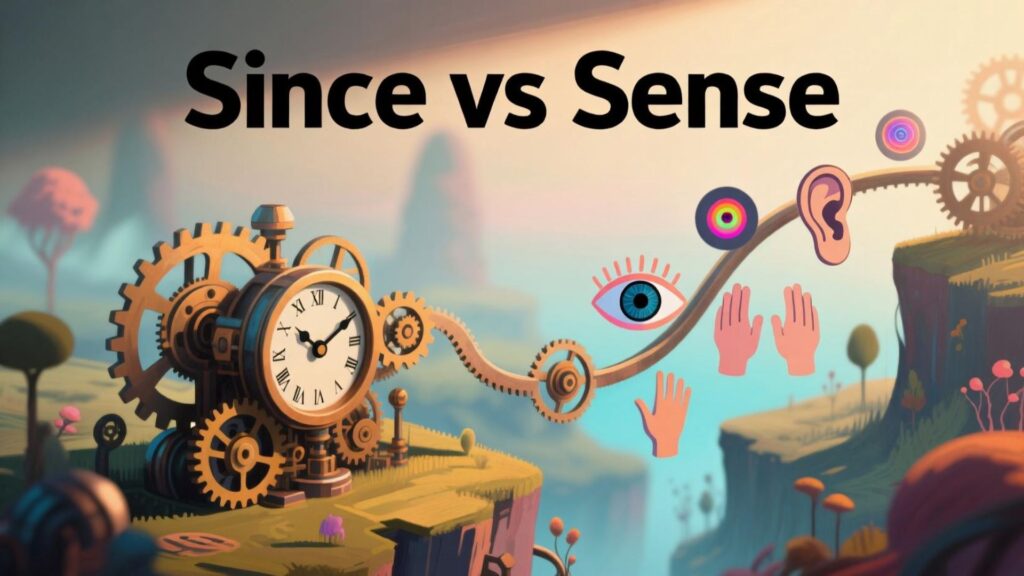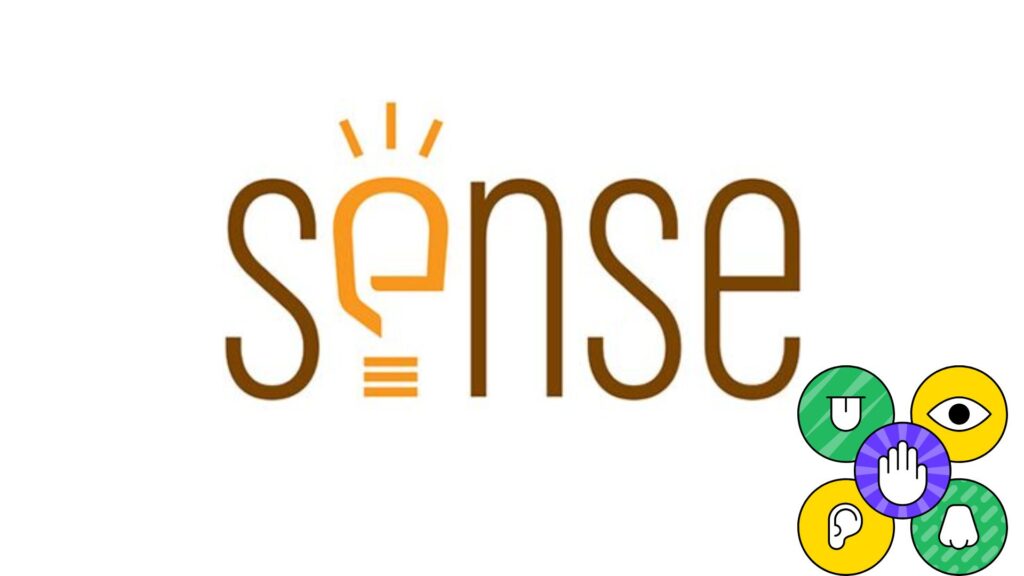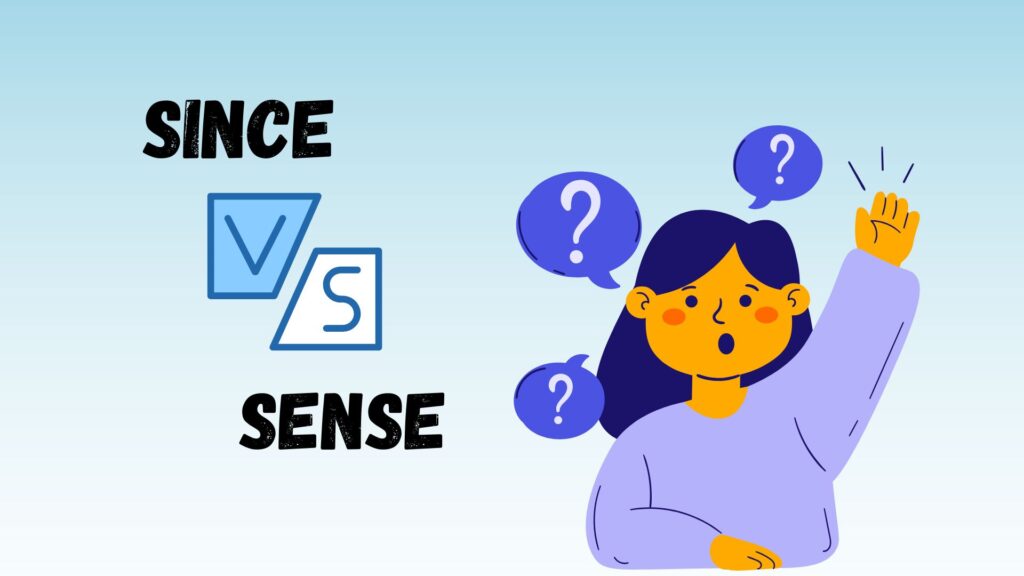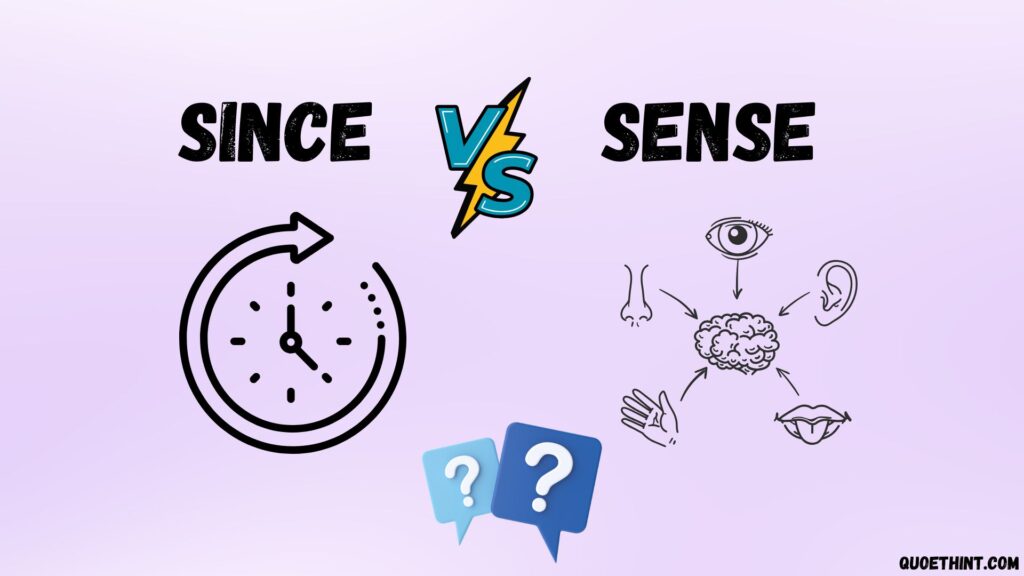English can be tricky. Words that look or sound similar often confuse writers and readers alike. One classic example is “since vs sense.” While both words are common, they carry completely different meanings. Mixing them up can make your sentences unclear or even funny in the wrong way. Let’s dive into the difference between since and sense, learn how to use each correctly, and explore real-world examples that highlight their functions.
Since vs Sense: The Core Difference

The word since deals with time or reason. It answers when something started or why something happened.
On the other hand, sense relates to understanding, perception, or meaning. It’s about how we interpret the world or grasp ideas.
Think of it this way:
- Since is like a time traveler or reason giver.
- Sense is like an internal compass that helps you understand, feel, or judge something.
The Word “Since”
The word since comes from the Old English siþþan, meaning “after that” or “from the time that.” Today, it serves three main roles: conjunction, preposition, and adverb.
Since as a Conjunction
As a conjunction, since introduces a reason or explains why something is true. It often acts as a softer replacement for because.
- Since you’re here, let’s start the meeting.
- We decided to cancel the trip since the weather looked bad.
Scenario Example (Email):
Subject: Meeting Reschedule
Hi James,
Since you’re traveling next week, I’ve moved our project update to Friday at 10 AM. Please confirm if this works for you.
Best,
Maria
Here, “since” introduces the reason for the schedule change.
Since as a Preposition
When used as a preposition, since pinpoints the starting point in time.
- I’ve lived in New York since 2018.
- She hasn’t spoken to me since Monday.
Scenario Example (Workplace Chat):
Alex: How long have you been with the company?
Rita: Oh, I’ve been here since January.
Since as an Adverb
Sometimes, since works alone as an adverb, referring to the time from then until now.
- He left for college in 2020 and hasn’t been back since.
- We spoke last year, but nothing has changed since.
Synonyms for Since
Depending on context, you can swap since with words like:
- because
- as
- due to
- from
- after
- following
- inasmuch as (formal)
The Word “Sense”

The word sense comes from Latin sensus, meaning “perception” or “feeling.” In English, it plays several roles but is most often a noun or verb.
Sense as a Noun
As a noun, sense refers to meaning, perception, or one of the five senses: sight, hearing, smell, taste, and touch.
- This explanation doesn’t make any sense.
- Humans rely on their five senses to interact with the world.
- Her comment gave no sense of urgency.
Scenario Example (Email):
Subject: Clarification Needed
Hi Daniel,
Your report is well-detailed, but some parts don’t quite make sense. Could you simplify section three and add a few examples?
Thanks,
Claire
Here, “make sense” means “easy to understand.”
Sense as a Verb
As a verb, sense means to perceive, detect, or feel something intuitively.
- She could sense the tension in the room.
- I sense you’re not comfortable with this idea.
- The dog quickly sensed danger nearby.
Scenario Example (Conversation):
John: I don’t know why, but I sense something’s off about this deal.
Emma: Same here, maybe we should dig deeper before signing.
Synonyms for Sense
Depending on the context, sense can mean:
- understanding
- significance
- meaning
- interpretation
- awareness
- intuition
- sensation
Since vs Sense in Common Mistakes

Because these words look similar, many learners accidentally swap them. A classic example:
❌ Does that make since?
✅ Does that make sense?
The phrase “does that make sense” is common in conversation, emails, and meetings. It means, “Is that clear or understandable?”
Using since here changes the entire meaning and creates confusion.
Practical Writing Tips
To avoid mistakes with since vs sense, keep these tips in mind:
- Use since if you’re talking about time or reason.
- Use sense if you’re talking about understanding, feeling, or perception.
- Double-check phrases like “make sense” this is never spelled with “since.”
Since vs Sense Examples in Everyday Life
Here are quick examples to cement the distinction:
| Sentence with Since | Sentence with Sense |
|---|---|
| I haven’t seen her since last week. | Her story didn’t make any sense. |
| Since you’re early, we can grab coffee. | He had a good sense of humor. |
| The law has changed since 2010. | She could sense the excitement. |
Word Origins and Etymology
- Since: From Old English siþþan, meaning “after that” or “from the time that.”
- Sense: From Latin sensus, meaning “perception, feeling, or meaning.”
Although they share no common origin, their similar spelling makes them easy to confuse. That’s why word usage in English often requires careful attention.
Why This Matters in Writing
Clarity is everything in communication. Using since vs sense correctly prevents misunderstandings and shows professionalism. Whether you’re writing an email to a client, submitting a report, or sending a quick message, the right word choice reflects your command of the language.
Final Thoughts
The difference between since and sense is simple once you see it:
- Since = time or reason
- Sense = understanding, perception, or meaning
Next time you’re tempted to write “does that make since?” pause and check yourself it should always be “does that make sense.”
Mastering small distinctions like these makes your writing sharper, your communication clearer, and your confidence stronger.
Bugti is the founder of Quoethint.com, a hub for English language tips, writing advice, and grammar guidance. With years of experience in English studies and a passion for clear communication, Bugti created this platform to make grammar and writing easy to understand for everyone.
